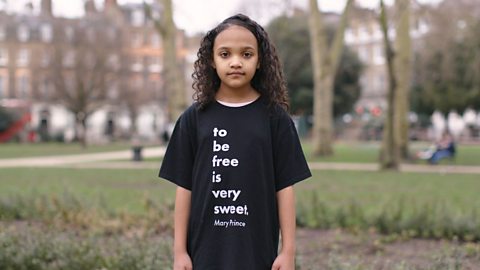ANASHE:Hi, my name is Anashe, and I'm 11 years old. People have been farming in Britain for thousands of years and over that time, the methods they use and the food they grow have changed in many ways. While our farmers grow a lot of the food we eat, we have toorder fruits and vegetables from around the world because our weather and soil isn't very good for planting them. Britain has a long history of people coming to live here from other countries. They bring with them appetites for food we don't usually grow in Britain. I'm off to meet David, who moved here from Zimbabwe in Africa, which is where I'm from too. He decided to try and grow the food he loves from our home country, even though every British farmer he met said it was impossible to grow here. But he proved them wrong.
ANASHE:
Hi, David.
DAVID:Hi. Come in. Welcome. Take a seat there.
ANASHE:Thank you.
DAVID:I was born in the eastern part of Zimbabwe where I grew up eating white maize. A firm favourite at the family dinner table grown by my father and uncle. I never, ever dreamed I would a farmer the UK, that's the last thing that would have come into my mind.
ANASHE:Why did you leave Zimbabwe?
DAVID:
I came here to work as a journalist, reporting big news stories like I did in Zimbabwe, but unfortunately I couldn't get a job to work as a journalist in this country. In 1996, I decided to follow in my father and uncle's footsteps and decided to set my sight on a new business idea, that was growing white maize.
ANASHE:Was it hard to grow white maize in Britain?
DAVID:
When I started, I didn't know how it was going to turn out, but I really love seeing plants grow, so I kept at it. After six years of trials, growing white maize in my back garden, I started searching for a plot of farmland so that I had space to grow enough of the crop to start a business. And I used to knock on farmers' doors asking if they had land to rent. It was so difficult. They either thought I was doing something suspicious or that I had no chance of growing enough white maize because of British weather. But I didn't stop there, I kept on knocking and knocking and eventually that led me to a 20 acre plot of land in Enfield. That was enough space for me to start a business. To my knowledge I am one of the only two black farmers in Britain. In 2007, I came up with a new product in the UK. That's white sweetcorn, which is different from the yellow sweetcorn that you probably know. But it's actually very sweet, it's tender and children love it. And I introduced to supermarkets and also restaurants. So apart from maize, I do a lot of other vegetables, exotic vegetables. After a while, we decided to open a shop in London and from there we opened another one in Walsall in the West Midlands, and we also started delivering to all cities in the UK.
ANASHE:What did your family think of you becoming a farmer?
DAVID:My wife and kids didn't really like the idea of farming, but after more than 15 years, our business is quite successful. I'm very happythat people who migrated to the UK from other countries like Zimbabwe now have a taste of the food that they grew up eating and I hope more and more people come to know about us and they will enjoy the food as well.
ANASHE:Speaking with David has made me realise just how much work goes into farming, especially when you're growing something that no one else thinks is possible. If not for these brave farmers trying new things over the years, we would miss out on lots of food we love and take for granted.
Video summary
In this short film 11-year-old Anashe meets David Mwanaka, and finds out about his journey from Zimbabwe to becoming a farmer in Britain.
Anashe asks David about what life was like for him coming to England, and breaking into a business that is currently one of the least diverse industries in the UK.
Like Anashe, David is original from Zimbabwe and the film deals with a challenge that some migrants bring with them: an appetite for food produce we do not usually grow in this country.
Follow David as he tells his aspirational story which will inspire and encourage pupils to believe that dreams can be possible when you persevere.
This short film is from the ΒιΆΉΤΌΕΔ Teach series, Black British Stories.
Teacher Notes
Before watching the film
You may want to introduce pupils to food and farming and what is traditionally grown locally and why. Pupils can explore what foods we eat that are grown in this country and what foods we import from other countries. This would be a good opportunity to look at other climates and what different foods need to grow.
You may also want to look at a map of the world and locate Zimbabwe on this map and discuss the difference in climates of this country and the UK, and possibly the foods that we eat and are eaten in Zimbabwe as a result.
Pupils may wish to consider if they were going to live in another country, what traditionally grown foods would they miss from the UK.
Please note, in the film David alludes to being treated with suspicion because he is black. Note that there may be pupils in your class who have faced similar experiences. Pupils may have been stopped at an airport, by police, watched closely in a shop. Or, even if they havenβt experienced it themselves, they may have friends or relatives or have experienced this, or seen stories about it on the news. As part of your preparation, consider how to manage discussion about the theme of bias with sensitivity.
Discussions on immigration should also be treated with sensitivity, and approached with particular care if there are pupils in the class who are refugees or asylum seekers.
Questions to consider
Depending on the focus of your lesson, you may wish to pause this short film at certain points to check for understanding, asking questions such as:
- What exotic fruit or veg are sold in the world food aisle of your local supermarkets?
- What fruits and veg do you eat at home?
- Have you ever tasted or seen white maize before?
- How do you think it felt trying to grow the maize for six years, and each time not being successful?_
- Would you have given up or would you have persevered?
- How has David demonstrated resilience and determination during his life?
- Have you tried to grow your own fruit and veg?
- How can growing your own fruit and veg impact the environment?
- Why do you think people would not let David rent their land?
- Why do you think there are so few black farmers in Britain?
- Why do you think David became a farmer when he moved to the UK, rather than a journalist (as he had been in Zimbabwe)? In the film David alludes to the discrimination he experienced when trying to obtain a job as a journalist in the UK. You could link this to the story of the Bristol Bus Boycott and how a βcolour barβ was used to discriminate against people of colour who wanted to become bus drivers.
- How do you think it felt to finally be successful?
- What do you think the vegetable is that David grows?
- What sort of people might appreciate the food David is providing?
Activities to further explore learning
Reflecting on Davidβs storyWrite a diary extract in role as David. Decide on what the turning point was for him and choose that event to write about. Or pupils could write several entries from when David started trying to grow the maize in his garden, to opening his second shop in the West Midlands. You may want to split the timeline into these events:
- Having the idea of growing white maize and planting the first seed.
- Seeing the plant grow tall but no maize forming.
- A year later and no maize growing (whilst working as a traffic warden).
- Seeing the first white maize grow after six years.
- Asking farmers for land to rent and being laughed at.
- Getting the land for the first time.
- People accusing you of being a thief (when working on the farm).
- Expanding your business by opening a shop.
Vegetation belts and biomes investigationUsing a climate map, identify different vegetation belts and how these link with different food products that are grown. Pupils could create a food map when particular herbs, spices and other foods are stuck in the country they are traditionally grown in.
Diversity in the communityIn the film David talks about being one of only two black farmers in the UK. This could lead to a class discussion on the lack of representation in certain careers in the UK. This could be broadened out to look at other protected characteristics.
Perseverance challengesProvide pupils with a number of challenges to promote perseverance (e.g. free a penny from an ice cube without smashing it). Pupils could think of what they need to do to persevere and link this to David. Can they write down some tops tips to help them persevere in the future?
Celebrating foodThis short film could provide an opportunity to have a food celebration afternoon, where pupils are invited to try fruit and veg from different countries around the world. Our 2021 Harvest-themed Live Lesson for 7-11 year-olds could also fit this theme - click or tap here for more information.
Key Vocabulary
- Civil rights - The rights of citizens to equality.
- Culture - A pattern of behaviour shared by a society, or group of people.
- Discrimination - The unjust or prejudicial treatment of different categories of people.
- Diversity - Differences in racial and ethnic, socioeconomic, geographic and academic backgrounds.
- Immigrant - A person who comes to a country to take up permanent residence.
- Immigration - The process of moving to a new country, with plans to live there permanently.
- Prejudice - A preconceived opinion that is not based on reason or actual experience.-Racism - The belief that people of different races or ethnic groups have different value in society, and using this against them.
This short film is suitable for teaching KS2 / 2nd level pupils and links to various areas of the curriculum including history (black history), geography (climate, land use and distribution of food resources), food technology (where our food comes from) and personal, social and relationships education (diversity and community).
DiversityThis short film raises issues of diversity and what we are doing as a society to bring about an equal balance. The agricultural industry is currently one of the least diverse industries in Britain. One key issue is that black farmers do not have access to land due to the traditional history of passing down farms to the next generation and big institutions renting land to traditional farming families.
Perseverance and aspirationThis short film highlights the importance of persevering when obstacles block the way.
Prejudice and discriminationDavid continued with his dream even though he was met with many people who did not think he could succeed. He was often treated with suspicion rather than the respect he deserved.
Mac Williams - Working in the coal mining industry. video
In this short film Abiodun MacDonald Williams, known to his close friends as Mac, talks to his neighbour, 11-year-old Iris, about what it was like working as a ventilation officer in County Durham in the 1960s.
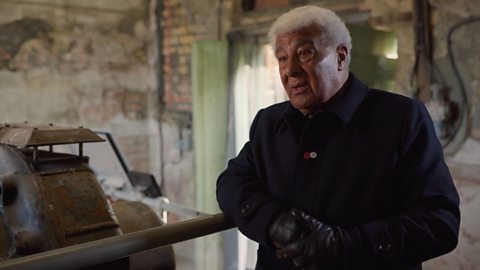
Alison Bennison - Working as a NHS nurse. video
This short film for primary schools follows Alison Bennison's journey to Britain from Barbados in 1960, to train as a nurse and work for the National Health Service. The story is told by Alison's granddaughter, Lindsey, and nine-year-old Dontay.

Christina Shingler - Becoming an author of children's literature. video
In this short film Felix, aged 10, talks to his grandmother Christina (Tina) Shingler, a writer who decided to do something about the lack of black characters in British literature.
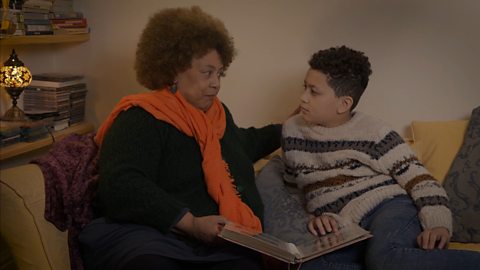
Dennis Morris - Becoming a photographer. video
This short film tells the story of Dennis Morris, a well-known photographer from London, originally from Jamaica, who photographed famous musicians including Bob Marley.

Elsie Owusu - Becoming an architect in Britain. video
In this short film 11-year-old Kendra meets Elsie Owusu, who moved from Ghana to the UK as a child and became an architect, and dealt with the challenges of working in a white, male-dominated profession.
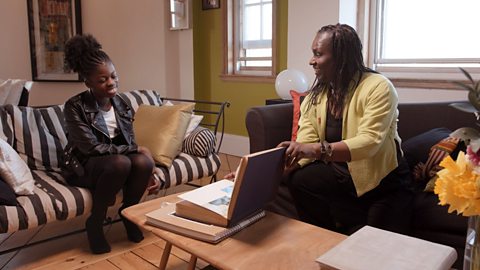
Eunice Olumide - Breaking into the fashion business. video
In this short film 12-year-old Lore meets Eunice Olumide, a second generation Nigerian who was born and grew up in Scotland and become a professional model.

Magid Magid - Becoming the youngest ever Lord Mayor of Sheffield. video
In this short film 14-year-old Abdirahman meets Magid Magid, a Somali-British activist and politician who served as the youngest ever Lord Mayor of Sheffield from May 2018 - May 2019.
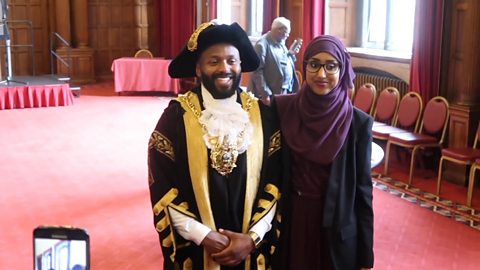
Vernon Samuels - The Bristol Bus Boycott of 1963. video
In this short film 13-year-old Amelia and Vernon Samuels, who represented Great Britain in the 1988 Olympics, tell the story of the Bristol Bus Boycott and Vernon's father, who was the first black bus driver in Bristol.
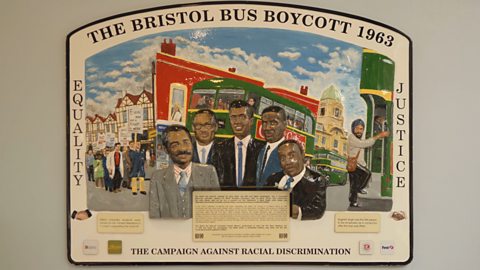
Yesha Townsend - A Bermudian poet in London. video
This short film tells the story of Yesha Townsend, a Bermudian poet who currently lives and works in London, and how she has been influenced by Mary Prince, a black woman who escaped from slavery.
